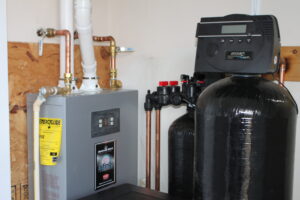Why Should You Have A Plumbing Inspection?
The modern day plumbing system can be a tricky thing. Your plumbing system is (fortunately) designed to be “out of sight, out of mind”. 99% of the time this is a great thing- no one wants to look at their pipes! However, if something is wrong with one of your pipes, you may not know about it until its caused a lot of damage. Oftentimes, problems with your plumbing start small. When they go undetected and are able to persist, they become larger and can eventually cause huge problems.
Having a plumbing inspection on a regular basis can save you a lot of headache- and money! Here are a few common plumbing problems that can go unnoticed unless you get a plumbing inspection:
Pinhole Leaks
Pinhole leaks are holes in the pipe caused by pitting corrosion. After the corrosion begins, these leaks can occur quickly. However, because these leaks begin with one or two drops at a time, they can go unnoticed for quite some time. After a few months of dripping one or two drops here and there, these leaks can rot out your insulation, studs, and sheetrock. The only way to prevent extensive damage from pinhole leaks is to have a plumbing inspection once a year! If a small pinhole leak is detected, repairing it early is much cheaper than repairing the extensive damage it can cause later.
Clogs
We’re all familiar with clogs, especially those in our shower drain or sink drain. Contrary to popular belief, clogs don’t form spontaneously! Clogs form slowly as debris gradually builds up from the inner walls of the pipe towards the center. If you pay really close attention over a period of time, you may be able to notice clogs starting to form because your water may begin to drain more slowly. Clogs are common occurrences and usually can’t be helped. An annual plumbing inspection is a great way to catch clogs as they start to form, instead of after they’ve already formed and caused you a big headache.
Lime Scale
Water with a high mineral content is known as hard water. Hard water is common to many areas of the country, as evidenced by this map, put out by the US Geological Survey. Hard water is more common in areas that have high amounts of certain mineral deposits. As hard water flows through the pipes in your home, it deposits small amounts of these minerals on the walls of your pipes. As the years pass and this process continues, these mineral deposits grow into lime scale. Lime scale is a substance that can restrict the flow of water through your pipes. If this process is allowed to continue, lime scale can harden and can no longer be removed. At this point, entire pipes in your plumbing system would have to be replaced. If you have your plumbing inspected regularly, lime scale can be caught early and removed before it does any serious damage.
Routine plumbing inspections can keep your plumbing running smoothly and can help you avoid costly repairs. For help with a plumbing repair or for your annual inspection, contact us today at [callout add_button=”no” button_text=”Learn More” button_url=”#”]
(678) 822-7095
[/callout]

